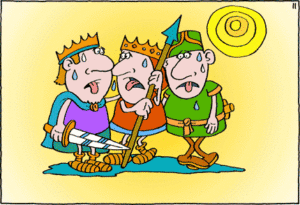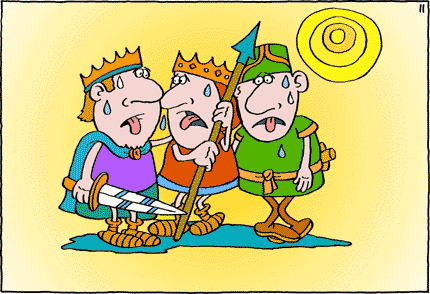2 Kings 3:1-27 Moab Revolts

There is still peace between Israel and Judah. They join forces and go to war against Moab who was in revolt against Israel.
Jehoshaphat was the author of this peace accord/alliance between the two. It apparently didn’t end with Ahab. Edom was in disarray at the time of Ahab’s death but they will join Israel and Judah in this battle. Hopefully they settled their king issue by that time.
Moab’s rebellion appears to come on the heels of Ahab’s death. But there had to be at least 2 years where nothing was done about it. Ahaziah was king for 2 year following Ahab’s death but it is his brother Jehoram who follows him on the throne that seeks to put an end to this rebellion.
Jehoshaphat wouldn’t even sail ships with Ahaziah but he went to war with Jehoram. Is this because of Jehoram’s step away from the Baals or because of the alliance with Ahab? Jehoram wasn’t even close to the relationship Jehoshaphat had with God but he wasn’t as bad as his father or brother. The idols Jeroboam made to replace God were still in place and the people were still turning to them; including Jehoram.
I find it curious that Jehoshaphat didn’t ask the same thing he did of Ahaz before joining him in battle. He asked to consult the Lord on their success. Maybe because it was such a disaster last time and Ahab didn’t listen anyway. Ask forgiveness instead of permission attitude.
When I was thinking about what it was that sparked the war I wondered why such a ‘small’ thing would cause so much discord. Then I realized that it wasn’t so small to Jehoram. The lambs would be used to breed even more sheep and the fleeces were integral to their industry. Beyond that, it was a respect and authority issue. Moab was subject to Israel. Their rebellion was a slap in the face to authority. That seems to be a major theme even today. “Might makes right.”
I believe that is essentially the thinking behind slavery of every kind and probably all prejudices too. “I’m more important than you so therefore you should serve me without question.” SO glad Jesus doesn’t treat us that way and that He tells us not to treat others like that either. He tells us to become the servant of all.
Back to our text. Did you notice that when trouble hit Jehoram started crying ‘woe is me and mine’ while Jehoshaphat asked for God’s guidance? Jehoram started blaming God for their predicament. “Alas! The Lord has called these three kings to give them into the hand of Moab” (verse 10). He didn’t consult God before going. He didn’t ask for His blessing or direction. He didn’t even think about God until the chips were down.
Jehoshaphat, even though he had consulted God first either, KNEW where to turn in times of trouble. “Is there no prophet of the Lord here, through whom we may inquire of the Lord?” (verse 11b). He KNEW where his ‘salvation’ lay.
One of Jehoram’s servants knew of Elisha and was willing to share that information. Was it because he knew of the great works of Elisha and Elijah personally or had he just heard about him from others? However he knew, the leaders recognized Elisha as their only hope. Jehoshaphat KNEW the Lord was with him. So they went to him.
Take note of who is listed as going to Elisha. “So the king of Israel and Jehoshaphat and the king of Edom went down to him” (verse 12b). When someone is a close friend you call them by name. When you don’t know someone well or are removed from them you call them by their title or proper name. Jehoshaphat is the only one called by name because he is the only one with a relationship with the same God Elisha serves. The others have no standing. They have no right or relationship to stand on to approach God. But His children are ALWAYS welcome at His throne. I wonder if Jehoshaphat was secretly itching to meet Elisha anyway. This is certainly a good excuse to do so.
When Elisha challenges Jehoram regarding seeking the Lord NOW, Jehoram claims it was the Lord who put this mission together in the first place. I wonder why he says that. Is he thinking that by putting God ‘on the hook’ for the success of this engagement that He will have to act on their behalf? Or does he attribute everything big to the hand of God? Maybe it is only the things that go bad that he gives God credit for.
Elisha’s answer shows who God is honoring. “As the Lord of hosts lives, before whom I stand, were it not that I have regard for Jehoshaphat the king of Judah, I would neither look at you nor see you” (verse 14). Elisha’s God was also Jehoshaphat’s God.
I’m curious why the musician. God’s hand was on the musician when he played. Was he to play in camp and God would bring the water there? Was he to minister to Elisha’s soul? What role did he play? God did something through him otherwise His hand wouldn’t have been needed. Maybe it filled the hearts of the kings with faith.
The answer God sent was unique but Elisha said it was a “light thing in the sight of the Lord” (verse 18a). Was Elisha saying that sending water in this unusual way was ‘easy peasy’ to God or was he doing a tongue in cheek reference to what was about to happen? Moab would fall into Israel, Judah and Edom’s hands because of a ‘light thing’.
The light on the water tricked Moab into running full tilt into the camp of our three kings. They were expecting to find dead bodies everywhere because of the ‘blood’ they saw spread out across the land. They were the ones who would shed blood.
When I was thinking about the water I was reminded of the fact that, before Noah, this was how God watered the earth. He didn’t send rain. Instead He brought water up from out of the ground in the form of dew. In this instance the ‘dew’ was remarkably heavy as it filled the dry stream beds. God also opened the fountains of the deep to mix with the rain water to create the flood. So doing this just a little bit for Jehoshaphat was ‘no big deal’ for God. But I still like the “light thing” that happened with this water.
Moab had seen the hand of God in action before on behalf of Israel. They were the last people God had Israel deal with before going into the Promised Land. It was because they had induced Israel to worship their gods. They were in for a repeat lesson. This lesson would be VERY severe. It wouldn’t end with the people. The cities, the land, the streams, and even the trees would suffer this time.
Moab’s response to seeing the three armies before them was to muster EVERYONE they could. When they rushed in to ‘gather the spoils’ that meant that EVERYONE possible was ripe for slaughter. I would say ‘like lambs to the slaughter’ but these ‘lambs’ fought back and attacked first.
The king of Moab’s response is one of desperation. He first chooses the one element of the forces against him that are not Israelites. Judah and Israel are BOTH God’s children while Edom isn’t. He attacks ‘the weakest link’ in their chain. But when God is in charge of the battle there is no ‘weak link’. He strengthens it all. His next desperate act is to appeal to his god with what he considers his BEST sacrifice. He offers his eldest son on the wall of the city where he is taking refuge.
The last section of our reading was a bit confusing to me. I had to check out my bible helps to better understand the “great wrath against Israel” (verse 27b). This isn’t a wrath from God but from the Moabites who just watched the actions of their king. Seeing the lengths he would go to in order to defeat Israel put a deep hatred of them into the hearts of the people of Moab. “Look what you made me do!” It enraged them and, rather than continuing on in battle, Israel withdrew and returned home. It could be like ‘never poke a bear in his den’ kind of thing.
I wonder if this is part of the basis of the deep hatred that exists between these two peoples today. God is the only one who can heal that kind of hatred. One born of bitterness.
Father God, thank You for the relationship we share. I can’t imagine life without You! NO other god would do. There is NO God but You. I wish I could wash away all the bitterness and hatred in the world. I wish I could stop the attitudes of superiority, even among Your own children. But these are things that are going to continue as long as Satan is still free. One day it WILL end. Until then, at least make sure it ends in me. Tear up every root of bitterness hidden in my heart. Break up any areas of ‘entitlement’ that I’ve laid down. Let me be Your servant and a servant of ALL. And let that service bring glory and honor to You.
** When I was searching for a graphic to use I stumbled across graphics saying to “dig ditches” for the water. I thought this must come up in Chronicles and went searching for the verses containing this. I found it in other translations, including King James in the text we were reading today. My translation of the bible, English Standard Version, doesn’t have that. I don’t know which way is correct but I like the digging ditches to contain the blessing God is about to bestow idea. Wanted to share this discovery in case you thought I missed it. I did but not by my design. I guess God got it across to me another way. I’m very grateful He did!



